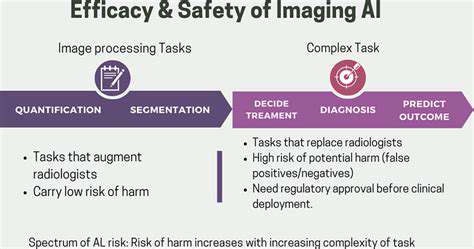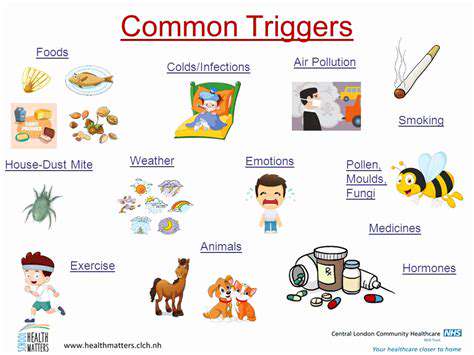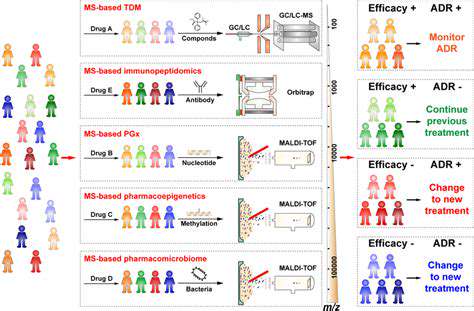Cultivating Optimism: A Habit for a Happier Life
Negative thought patterns are insidious, often creeping into our minds without us even realizing it. They can manifest in various forms, from catastrophizing about potential negative outcomes to dwelling on past mistakes. Recognizing these patterns is the first step towards breaking free from their grip. Identifying these patterns isn't about fault-finding, but rather about understanding how our thoughts influence our feelings and behaviors.
Common red flags include: always expecting the worst, focusing solely on perceived flaws, and exaggerating the significance of minor setbacks. These patterns often stem from past experiences, learned behaviors, or underlying anxieties. Recognizing these red flags is vital for effectively addressing and managing them.
The Impact of Negative Thoughts on Well-being
The impact of consistently negative thought patterns on our well-being is significant and multifaceted. These patterns can lead to feelings of anxiety, depression, and low self-esteem, impacting everything from our relationships to our overall sense of happiness. By feeding on negative thoughts, we create a vicious cycle where these negative emotions reinforce each other, making it difficult to move forward and experience positive outcomes.
Chronic negativity can also manifest physically, contributing to stress-related health issues. Understanding this link is crucial for prioritizing mental well-being and adopting strategies for cultivating more positive thought patterns.
Common Negative Thought Patterns: Examples
Several common negative thought patterns exist, each with its own subtle nuances. One example is all-or-nothing thinking, where individuals perceive situations in extreme terms, failing to see the gray areas. Another is overgeneralization, where a single negative event is interpreted as a recurring pattern of negativity.
Other examples include mental filtering (focusing only on the negative aspects of a situation), disqualifying the positive (dismissing positive experiences as insignificant), and emotional reasoning (assuming that because you feel a certain way, it must be true).
Unraveling the Roots of Negative Thinking
Understanding the roots of negative thinking is crucial for effective change. Often, these patterns are deeply ingrained, stemming from childhood experiences, learned behaviors, or unresolved emotional traumas. Exploring these underlying causes can provide valuable insights into the reasons behind negative thought patterns and pave the way for developing healthier coping mechanisms.
Identifying specific triggers, stressors, or past events that contribute to negativity is a key element of unraveling the root causes. Understanding these patterns can help you develop strategies to challenge and reframe these negative thoughts.
Strategies for Identifying and Challenging Negative Thoughts
Once you've identified negative thought patterns, developing strategies to challenge and reframe them is essential. Journaling can be a powerful tool, allowing you to track your thoughts and feelings in a safe space. Practice mindfulness and meditation techniques to increase awareness of your thoughts and emotions without judgment.
Consider seeking professional support from a therapist or counselor, who can provide guidance and strategies tailored to your specific needs. Learning to identify and challenge negative thoughts is a continuous process requiring patience and self-compassion.
Techniques for Reframing Negative Thoughts
Reframing negative thoughts involves actively replacing negative self-talk with more positive and realistic perspectives. Cognitive restructuring techniques are helpful in this process, encouraging you to question the validity of negative thoughts and replace them with more balanced and helpful ones.
Consider challenging the evidence supporting your negative thoughts. Are they based on facts or assumptions? Are there alternative explanations for the situation? Practicing these techniques can lead to a more optimistic outlook and healthier emotional responses.
Cultivating a More Positive Mindset
Cultivating a more positive mindset is a journey, not a destination. It requires consistent effort, self-compassion, and a willingness to learn and adapt. Surrounding yourself with supportive people, engaging in activities you enjoy, and practicing gratitude can all contribute to a more positive outlook.
Implementing mindfulness practices and consistently challenging negative thought patterns are crucial steps in fostering a more positive and resilient mindset. Remember, cultivating optimism is a lifelong process that benefits every aspect of your life.
Practicing Gratitude and Appreciation
Understanding the Power of Gratitude
Gratitude is more than just a polite acknowledgment; it's a powerful emotional state that can profoundly impact our well-being. Recognizing and appreciating the good things in our lives, big or small, shifts our focus from what's lacking to what's abundant. This shift in perspective can foster a sense of contentment and happiness, laying the groundwork for a more optimistic outlook on life. Cultivating a gratitude practice isn't about ignoring challenges, but rather about acknowledging the positive amidst the difficulties, ultimately contributing to a more resilient and optimistic mindset.
Research consistently demonstrates a strong correlation between gratitude and happiness. Studies have shown that individuals who regularly practice gratitude tend to experience higher levels of life satisfaction, improved mental well-being, and stronger relationships. By consciously focusing on the positive aspects of our lives, we can rewire our brains to appreciate the good, creating a more optimistic and fulfilling experience.
Identifying Gratitude Triggers
The key to consistent gratitude practice lies in identifying what sparks our appreciation. These gratitude triggers can be anything from a beautiful sunrise to a kind gesture from a friend. It's important to pay attention to the specific moments or experiences that evoke a sense of thankfulness. Keeping a gratitude journal or simply taking a few moments each day to reflect on positive experiences can help us identify these triggers and cultivate a deeper appreciation for the everyday miracles around us.
It's not about finding grand gestures; it’s about noticing the small things that make our life richer. A delicious cup of coffee, a helpful colleague, or a comforting hug from a loved one – these seemingly insignificant moments hold immense value when we consciously acknowledge them. By actively searching for these everyday gratitude triggers, we become more attuned to the positive aspects of our lives, fostering a deeper sense of contentment and optimism.
Incorporating Gratitude into Daily Routine
Integrating gratitude into our daily routines makes it a sustainable habit, rather than a fleeting exercise. This can involve setting aside specific times for reflection, such as during breakfast or before bed. Simple practices like keeping a gratitude journal, expressing thanks to loved ones, or simply taking a moment to appreciate the beauty of nature can all contribute to a more grateful outlook. These seemingly small acts can significantly impact our overall emotional well-being and contribute to a more optimistic approach to life.
Consistency is key. Don't try to overhaul your entire routine at once. Start with small, manageable steps, and gradually incorporate more gratitude practices into your daily life. Over time, these practices will become ingrained habits, contributing to a more profound sense of appreciation and optimism.
The Benefits of Expressing Gratitude
Expressing gratitude extends beyond personal well-being. Sharing our appreciation with others fosters stronger relationships and cultivates a more positive social environment. A simple thank you can brighten someone's day and strengthen the bonds we share. Expressing gratitude to our friends, family, and colleagues creates a ripple effect of positivity, reinforcing the importance of appreciation and strengthening connections.
Gratitude isn't just about receiving; it's about giving as well. Expressing gratitude to those who have supported us, helped us, or simply made our lives better fosters a sense of connection and strengthens our relationships. By actively expressing our appreciation, we contribute to a more positive and supportive environment for ourselves and others.
Overcoming Obstacles to Gratitude
While gratitude is a powerful practice, it's not always easy to maintain. Sometimes, negative emotions or challenging circumstances can make it difficult to focus on the positive. It's crucial to acknowledge and accept these feelings without judgment, and to approach gratitude practice with compassion and understanding. Learning to cultivate gratitude is a journey, not a destination, and setbacks are a natural part of the process. It's important to be kind to yourself and to remember that gratitude is a skill that can be developed over time.
Practicing gratitude doesn't mean ignoring difficulties. Instead, it means recognizing and acknowledging the positive aspects of our lives, even in the face of adversity. This allows us to develop resilience and a more optimistic outlook on life. By accepting challenges as opportunities for growth and maintaining a focus on appreciation, we can navigate life's ups and downs with greater ease and optimism.
Efficient parking management systems significantly contribute to smoother traffic flow by reducing congestion around parking areas. By optimizing parking availability and guiding drivers to empty spaces, these systems minimize circling and searching, which in turn decreases the time drivers spend looking for parking. This leads to reduced emissions and improved air quality in urban areas, as well as a more pleasant and productive experience for drivers and pedestrians alike. The resulting reduction in idling time also contributes to a more efficient use of public resources.

Taking Action and Maintaining Momentum

Taking Proactive Steps
Taking proactive steps towards achieving your goals is crucial for maintaining momentum and staying on track. Proactive individuals often anticipate challenges and develop strategies to overcome them, which helps them maintain a consistent drive. This approach fosters a positive feedback loop, where success breeds further motivation and action.
Identifying specific actions that contribute to your overall objectives is essential. Breaking down large goals into smaller, manageable tasks makes the path forward less daunting and more attainable. This structured approach allows for regular progress checks, providing a clear picture of your advancement and enabling adjustments as needed.
Prioritizing Tasks and Setting Deadlines
Prioritizing tasks based on importance and urgency is a cornerstone of effective time management. This prioritization ensures that critical tasks receive the necessary attention and resources, preventing important matters from slipping through the cracks. Prioritizing tasks efficiently allows you to focus your energy and efforts on what truly matters, leading to a more productive workflow.
Setting realistic deadlines for each task is another critical element. Deadlines provide a sense of urgency and accountability, motivating you to stay focused and complete tasks in a timely manner. This disciplined approach fosters a proactive mindset and avoids procrastination.
Building a Supportive Network
Surrounding yourself with a supportive network of mentors, colleagues, or friends can significantly impact your progress. Sharing your goals and challenges with trusted individuals can provide valuable insights and perspectives, leading to more effective strategies and solutions. Having a support system can provide encouragement and accountability, helping you stay motivated during challenging times.
Overcoming Obstacles and Challenges
Obstacles and challenges are inevitable in any pursuit. However, the way you approach and overcome them determines your success. A resilient mindset, coupled with a willingness to adapt to changing circumstances, is crucial for maintaining momentum. Adapting your strategies to overcome unexpected obstacles is essential for staying on track and achieving your objectives.
Developing problem-solving skills and learning from setbacks is important. Analyzing what went wrong, identifying potential solutions, and implementing new strategies, can help you bounce back from setbacks and continue moving forward. This approach fosters a growth mindset, allowing you to view challenges as opportunities for learning and improvement.
Maintaining Focus and Motivation
Maintaining focus and motivation is essential for sustained progress. Establishing routines and practices that support concentration and engagement is crucial. Techniques like mindfulness and meditation can help manage distractions and maintain a clear mental space, leading to better focus. Regular self-reflection and goal review sessions are essential to maintain alignment with your objectives and stay motivated.
Celebrating Milestones and Acknowledging Progress
Acknowledging and celebrating milestones, no matter how small, is critical for maintaining motivation and momentum. Recognizing your achievements reinforces positive behaviors and motivates you to continue striving for your goals. Regularly acknowledging your progress boosts your self-confidence and reinforces the value of your efforts. Celebrating milestones provides a sense of accomplishment and reinforces the positive cycle of progress, encouraging you to maintain your drive and commitment.











